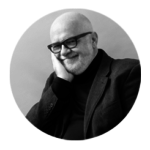In January Michael Doneman from Edgeware Creative Entrepreneurship will organise a three-hour workshop at transforma bxl for established small businesses wanting to develop, change and innovate. We wanted to know a little more about what rethinking your business means, Michael’s working method, and experience… so here you have, good reading!
Hi Michael, according to you why entrepreneurs should rethink their business?
Well, they should rethink their business if they feel like :
I’m working too hard and not enjoying it enough
No one sees my thing as beautifully as I do
I don’t know who I’m selling to
I don’t know what the real value of my thing
I have no understanding of what success means to me – or to my customer
I’m terrified by the idea of working for someone else
I can’t see the forest for the trees
It’s all too complicated and I need clarity…
In Belgium, there is a large percentage of small structures that fail. It seems obvious that to avoid that and be sustainable in time they need to rethink their business. So concretely, what does it mean?
We shouldn’t make a monster out of ‘failure’. When you learned to ride a bike, did you ever fall off? And then what did you do? Most people got up and rode just a little bit better. Gamblers fear failure. Entrepreneurs calculate failure: risk calculations are always part of the equation, and if you don’t fail occasionally, you aren’t moving forward. ‘Rethinking’ and ‘reframing’ are techniques which enable us to learn from failure – at Edgeware we call them ‘brave failures’. Fail often, fail better, and you eventually succeed.
You have many years of experience in the field of entrepreneurship. What do you think are the biggest barriers that keep entrepreneurs from rethinking their business?
It’s a psychographical thing. ‘Entrepreneur’ is from the Old French ‘entreprendre’ – ‘to undertake’, to take something on, to see things as projects (as in the German, ‘Unternehmer’). An entrepreneur is born with and/or develops the mindset that he wants to *make* a job, not *take* a job. His business becomes his baby, it’s part of his, intensely meaningful. There’s never an ‘off’ switch’, any more than there’s an ‘off’ switch for a monk or an artist. For an entrepreneur, your business is more than ‘what you do’, it’s ‘who you are’. All of this takes courage because there will always be failures, setbacks, speed bumps – a bit like parenting – and if you’re not up for that, get a job.
The motto of Edgeware is: make money, have fun and change the world. As an entrepreneur, could you explain and give us an example of how you apply this motto to your own scale?
Our practice has its roots in community cultural development work, and particularly our engagement with Aboriginal Australians. Working with them in ways of commercialising and sustaining their cultural work, we noticed that the personal and social levels of meaning were as important as the financial ones. Most business education takes a mechanical, mercantile approach to the project like it’s a machine. For Edgeware, businesses are ‘wet’ – they are relational, not just transactional. Particularly in the 21st Century, we want to have relationships with our products and services, we want to know and value *story*. We also want to care for our physical and social environment – we’re related to these, as we’re related to our mother. Aboriginal people have enormous cultural advantage in this sense – they’ve been practicing like this for millennia.
An example might be the decision I made when I started my coaching practice that 10% of gross income would be donated to a not for profit I admire. Ethical practice is at the core of what I do in business and (I try) in life – trust, compassion, exchange, mutuality, and story are business values.
What sorts of results have you seen in your work with small organizations that decided to rethink their business?
Really wide-ranging results. Some people find fellow travellers in a course and set up new (and often stronger) businesses and other collaborations. I think people generally appreciate the investment of their personal values and value creation through their work on their business. They make meaning as well as money.
If I’m an entrepreneur, why should I attend your workshop? What is your working method? What makes the difference? What will I get out of it?
It will be different for everyone. My working method is to lay a table with dishes that experience has told me are nutritious and useful for entrepreneurs. Then – again through experience – I respond to the dishes my customers pick up, and also the ones they ignore. I lay tables, tells stories and ask questions. What you get out of it depends on what dish you pick up (and some of them you won’t necessarily like – we call these ‘the spinach dishes’).
 Michael Doneman is founding director of Edgeware. He has a background in community cultural development which inspired work in business design, vocational education and training, and information technology. He has a coaching practice focused on the value of creativity in the growth of entrepreneurs, intrapreneurs, and leaders. He’s developing expertise in the application of Solution Focused coaching and leadership processes to the establishment, growth, and enrichment of business practice. Michael is passionately committed to the idea that ethical, creative entrepreneurship can change the world.
Michael Doneman is founding director of Edgeware. He has a background in community cultural development which inspired work in business design, vocational education and training, and information technology. He has a coaching practice focused on the value of creativity in the growth of entrepreneurs, intrapreneurs, and leaders. He’s developing expertise in the application of Solution Focused coaching and leadership processes to the establishment, growth, and enrichment of business practice. Michael is passionately committed to the idea that ethical, creative entrepreneurship can change the world.







